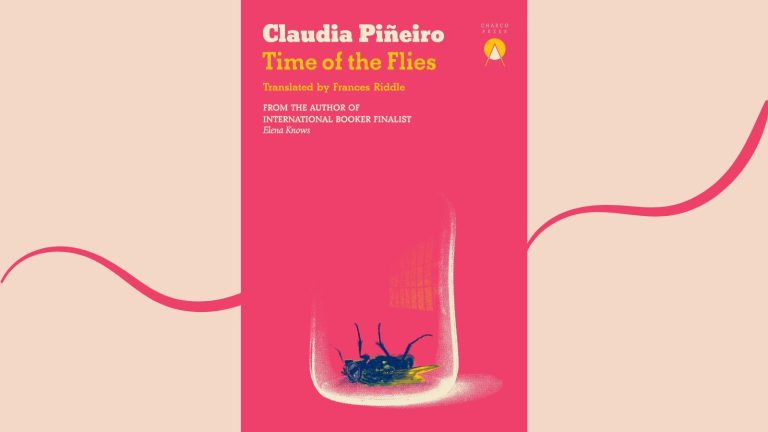
Crime and Feminism in Claudia Piñeiro’s Time of the Flies
28 August, 2024The recent translation by Frances Riddle of Argentine writer Claudia Piñeiro’s latest novel, Time of the Flies, introduces English readers to unexpected alliances exploring a kind of female solidarity that questions patriarchal societal norms.
What challenges must one face when sidelining personal desires and needs in the name of a higher purpose? How much would one person be willing to relegate in the pursuit of meaning and meaningfulness? These questions apply to the protagonist of El tiempo de las moscas (2022), the latest novel by award-winning Argentine author Claudia Piñeiro, as much as they could resonate with the process behind the English translation of the book by Frances Riddle, published as Time of the Flies (2024) by Charco Press during Women’s Translation Month.
What is at stake in both cases is a corpus of different nature: on the one hand, the organic body of the main character, Inés Experey; on the other hand, the textual body of the novel’s translation; each of them tensioned between integrity and gaps of creative potential, stability and endless possibilities of permutation and change. What could be read as a linguistic and cultural challenge for Riddle takes on a different direction for Experey, a woman burdened by her past actions who, after completing a 15-year prison term for poisoning her husband’s mistress, faces a dangerous choice.
In the background of a Buenos Aires portrayed as an ambivalent landscape of opportunity and despair, Inés gets involved in an ethically murky situation when Ms Bonar, who wants to execute an act of revenge, seeks to hire the services of “MMM: Muerte, Mujeres y Moscas” (aptly translated into English as “FFF”—short for “flies, females, and fumigation”), the pest control company founded by Experey and her former inmate friend Manca. This presents a moral test to Inés, a character attempting to reconstruct her life while willing to do whatever it takes to safeguard a better future for herself and her friend, who deals with a severe health condition.
Serving as an unbinding sequel to Piñeiro’s debut novel Tuya [Yours] (2005), in which Experey makes her first appearance, Time of the Flies presents a captivating tale that delves into social injustice and its connection to criminality, gender power dynamics, and post-incarceration life in contemporary Latin America. The book blends an engaging crime storyline with a feminist discourse that captivates as much as it challenges the reader to reflect on the adversity faced by marginalized women trapped in perpetual cycles of violence. Through intense dialogue and depictions that combine deep character introspection and the rawness of everyday life struggles, Piñeiro crafts a solid and compelling narrative showcasing Inés and Manca’s unwavering bond as one determined by both hardship and convivial autonomy.
In tune with recent Latin American literature that problematizes the boundaries between nature and culture, the novel is far from presenting the figure of the fly as a crystallized metaphor, instead portraying it as a complex notion not exempt from controversial meaning. “70% of a fly’s DNA is identical to a human’s”, Inés notes in Chapter 10, inviting the reader to recognize the existing ties between species. If, as the protagonist observes in Chapter 10, “that fly, my fly, in a way, marked my path and made me what I am today,” the novel sets to explore the potential of animal-human assemblages and other unexpected alliances to break hegemonic power dynamics that undermine those creatures deemed as undesired. In that sense, Time of the Flies condenses in its title –particularly in its reference to this insect– the lure of decaying realities and serendipitous intrusion connected to persistent narratives of stigmatization while taking a firm stance for resilience, adaptation, and dynamism as beacons of hope for the underdogs.
In what is possibly one of her most riveting, compelling, and rich crime stories to date, Piñeiro demonstrates why she has rightfully earned her place among an exciting pool of renowned contemporary Latin American female writers. The vibrancy of Piñeiro’s writing is never lost in translation in Frances Riddle’s nuanced and meticulously crafted English version. Following their recent nomination to the 2022 International Booker Prize for Elena Knows [Elena sabe] (2007), Piñeiro and Riddle consolidate their partnership with Time of the Flies, a book that reminds us about the world of possibilities that Latin American genre literature in translation can open to readers all over the globe.
Time of the Flies is available for purchase from Charco Press.
Fernando Valcheff García is a PhD candidate in Spanish at the University of Michigan. His research uses critical theory to explore the connections between meat/flesh imagery and political imagination in contemporary Latin American literature by women writers.
Follow Sounds and Colours: Facebook / Twitter / Instagram / Mixcloud / Soundcloud / Bandcamp
Subscribe to the Sounds and Colours Newsletter for regular updates, news and competitions bringing the best of Latin American culture direct to your Inbox.

